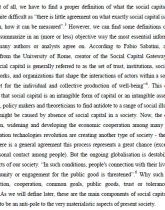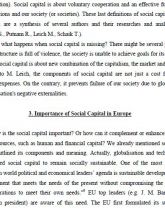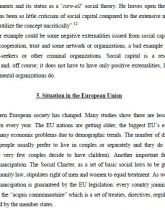Hľadaj
Zobraz:
Univerzity
Kategórie
Rozšírené vyhľadávanie
45 146
projektov
Prospects of the European Social Capital Development
| Prípona |
Typ semestrálna práca |
Stiahnuté 1 x |
| Veľkosť 0,1 MB |
Jazyk anglický |
ID projektu 4262 |
| Posledná úprava 12.08.2017 |
Zobrazené 2 145 x |
Autor: - |
 Zdieľaj na Facebooku
Zdieľaj na Facebooku |
||
| Detaily projektu | ||
- cena:
40 Kreditov - kvalita:
92,3% -
Stiahni
- Pridaj na porovnanie
- Univerzita:Ekonomická univerzita v Bratislave
- Fakulta:Fakulta medzinárodných vzťahov
- Kategória:Jazyky » Angličtina
- Predmet:Anglický jazyk
- Študijný program:-
- Ročník:-
- Formát:PDF dokument (.pdf)
- Rozsah A4:17 strán
Nowadays, the problem of social capital has become much more important than we could expect at the beginning of its theoretical development in the mid-eighties. Notion of human capital has become already quite popular in many countries and companies: thanks to the globalisation, investments increase and political or world companies’ leaders have realized investment in people’s knowledge and professional experience is very important. But in addition to the human and investment capital there is another form of it too, the social capital. Modern theories of economical growth show its determinants have changed. Economists introduced social capital as an important determinant of macroeconomic performance in their analysis.1 This is the main reason why I choose this topic. I decided to make a research in available materials and data of what the social capital is and what are its prospects in The European Union. I took into account only the EU and its 25 member countries. The EU is trying to join the USA and other world leaders (e.g. China, Japan, India or South Korea)2 in Research and Development (one of the means of attaining economic growth) and their expenses on it. Small European countries have the only possibility how to stay competitive: to find a common way of cooperation within the EU and to put their resources and efforts together. This is very important for the development of social capital too. As it has become an important determinant of economic growth, the EU needs to form its (or to develop the existing) social capital too. Firstly, my objective is to find a clear definition (or definitions) of social capital. Then I would like to present the prospects of its development within the EU and some basic arguments why the social capital is important for Europe and particularly for the EU. Finally, my objective is to enrich reader’s knowledge about one of different determinants of economic welfare and growth in our society. I think this might be useful especially for students of the Faculty of International Relations, e.g. for their own researches or as a summarized information about the social capital and its importance in integrated Europe.
Kľúčové slová:
social capital
European Union
human capital
prospects
negative aspects
Obsah:
- PROSPECTS OF THE EUROPEAN SOCIAL CAPITAL DEVELOPMENT -1-
CONTENTS -2-
1. Introduction -3-
2. Definitions of Social Capital -4-
3. Importance of Social Capital in Europe -5-
4. Negative Aspects of Social Capital -6-
5. Situation in the European Union -7-
6. Measure of Social Capital in the European Union -10-
7. Prospects of Social Capital Development in the EU -11-
Conclusion -13-
Slovak Summary -14-
Glossary -16-
Referencies -17-
Zdroje:
- Coleman, J.S.: Foundations of Social Theory, Cambridge, Harvard University Press (1990)
- Johnston, G.; Percy-Smith, J.: In search of social capital, Policy & Politics, Volume 31, No 3 (2003), pp. 321-334
- Mihaylova, D.: Social Capital in Central and Eastern Europe, Budapest, Central European University (2004)
- Putnam, R.: Bowling alone, New York, Simon and Schuster (2000)
- Šajgalíková, H.: Cultural Literacy, Bratislava, Ekonóm (2003)
- Van Oorschot, W.; Arts, W.: The social capital of European welfare states: the crowding out hypothesis revisited, Journal of European Social Policy, Volume 15,No 1 (2005)
- Van Schaik, T.: Social Capital in the European Values Study Surveys, Tilburg University Netherlands (2002)
- Canadian Policy Research Initiative: Social Capital - A tool for public policy, brochure








